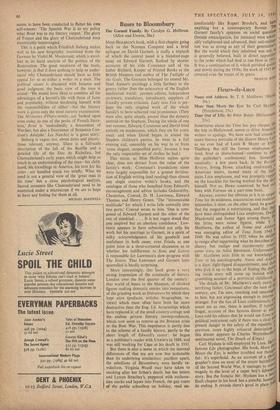Buses to Bloomsbury
Miss HEILBRUN's book, with a first chapter going back to the Norman Conquest and a brief epilogue on David Garnett, is really a triptych of which the central panel is a hundred-page essay on Edward Garnett, flanked by shorter accounts of his wife Constance and of nis father Richard, Keeper of Printed Books at the British Museum and author of The Twilight of the Gods. The Garnetts belonged (to extend Mr. Noel Annan's sociology a little further) to the gentry rather than the aristocracy of the English intellectual world : yeomen editors, independent reviewers, translators, introducers, suppliers of friendly private criticism. Lady into Fox is per- haps the only original work of the whole family's to have achieved real prominence. (They were also, quite simply, poorer than the dynasty centred on the Stephens. During the whole of one wet summer, Edward, Constance and David liVed entirely on mushrooms, which they ate for every meal; and when David began to attend the Stephen children's parties, he went in a full evening suit, ostensibly on his way to or from `some elegant, unspecified party,' because it was the only respectable set of clothes he had.) This status, as Miss Heilbrun makes quite clear, does not detract from the value of the family's work: Constance's translations alone were largely responsible for a greater fertilisa- tion of English writing (and reading) than almost any single creative writer's books, and the catalogue of those who benefited from Edward's encouragement and advice includes Galsworthy, Chesterton, Conrad, D. H. Lawrence, Edward Thomas and Henry Green. `The "innumerable multitude" for which I write falls naturally into two parts,' Conrad wrote to him. `One is com- posed of Edward Garnett and the other of the rest of mankind. . . . It is not vague dread that you inspired but an absolute confidence.' Law- rence appears to have submitted not only his work but his marriage to Garnett, in a spirit of sulky acknowledgment of his goodwill and usefulness in both cases; even Frieda at one point joins in a three-cornered discussion as to whether her indifference to Sons and Lovers is responsible for Lawrence's slow progress with The Sisters. That Lawrence and Garnett later quarrelled is hardly surprising.
More interestingly, this book gives a very strong impression of the continuity of literary London over the first quarter of the century : that world of buses to the Museum, of cloaked figures making dramatic entries into restaurants, of the grinding work as litterateurs by which they kept alive (prefaces, articles, biographies, re- views) which must often have been far more destructive than the Eng. Lit. lectureships which have replaced it; of the small country cottage and the endless private literary correspondences, which now seem as remote as the Bosnian crisis or the Boer War. This impression is partly due to the scheme of a family history, partly to the sheer •length of Edward's career : he began as a publisher's reader with Unwin's in 1888, and was still working for Cape at his death in 1937.
But there is also a Sense in which the internal differences of that era are now less noticeable than its underlying similarities; pacifism apart, the rebellions of Bloomsbury were hardly re- volutions. Virginia Woolf may have taken to smoking after her father's death, but her letters and Lytton Strachey's, peppered with exclama- tion marks and lapses into French, the gay tones of the public schoolboy on holiday, read un-
comfortably like Rupert Brooke's, and have anything but a contemporary flavour. Tb11 Garnett family's opinions on social question§ (female emancipation, for instance) were adiritr" ably enlightened and advanced, their anti-militar ism was as strong as any of their generation's' But the world which they inhabited was not, as is generally believed, built in direct oppositicr' to the order which had died at one blow in 1911' It was a continuation of it, which perished quiet and slowly during the 1930s; the work of 1945 Ilas covered even the traces of its grave.
FRANCIS HOO


































 Previous page
Previous page